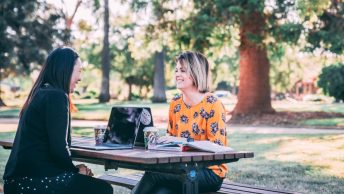Understanding the best ways for you to study at uni is a really important part of being a student. After all, you are at uni to get a degree, so study should be high on your list of priorities. Effective study skills will give you the edge to improve your results, but also improve your health and wellness.
Here are six different study hacks to help you make the most of your study.
1. Get yourself into a routine
Life can get a bit busy, so juggling your studies with work, fun and other social commitments can be a bit tricky. Organising a study routine will allow you to get your studies in order. You can also organise all your other commitments around them. Once you do that, try to stick to that routine, because once you get into it, it will just be something that happens rather than a chore.
2. Set achievable goals
Goal setting is one of the best things you can do because it is a plan for success. Lay out what you want to achieve, how long it will take for you to get there and what it looks like once you’ve achieved it. Remember however to make sure that the goals you set are attainable because there is no point setting a goal that you cannot achieve.
3. Get started early
It may be difficult, but try and start an assessment soon after you receive it. This will give you plenty of time to draft, read over, re-do and then submit. By doing this you will avoid the potential panic that you will get trying to finish and submit it the night that it is due.
When you have started the assessment early, you have the option of getting feedback from your lecturer or the ALLAN team, so starting it early will give you an advantage.
Look ahead to session 2. Check out your subjects and if you’re doing something you aren’t familiar with then consider a Study Link subject to get you started on the right foot. Study Link offers free* short self-paced courses to help build your skills in particular areas.
*Study Link is free if you’re an Australian citizen, a New Zealand citizen or the holder of a permanent visa. Check out the website for more details.
4. Reward Yourself
Studying can be hard, so when you do the work, reward yourself. Do something for you, even if that means a little break between your studies. Reward yourself after studying, but also after completing an exam or an assessment or if you have achieved a goal. You have worked for it, spoil yourself.
5. Maintain a healthy lifestyle
Sleep, exercise and diet are all part of a healthy study routine because to study most effectively requires you to be sharp and attentive, and in a good mood to study. Sleeping 7 to 9 hours a night is best, as well as eating healthily and exercising regularly.
Exercise can also provide a break from studying, just to get out from your room or the library for a little relaxation, or a de-stress. Maintaining a healthy lifestyle can do wonders for your results, even though you might not realise it.
6. If possible, work in a group
If it is possible, work in a group. This could mean working with classmates to understand the content better or just get feedback from someone you live with. Getting someone to read over something or bounce ideas off can be incredibly helpful for your studies, and sometimes it beats being all alone studying by yourself. People can be your best asset for your studies.
If you’re after more study tips, make an appointment with a Learning Skills Adviser.










